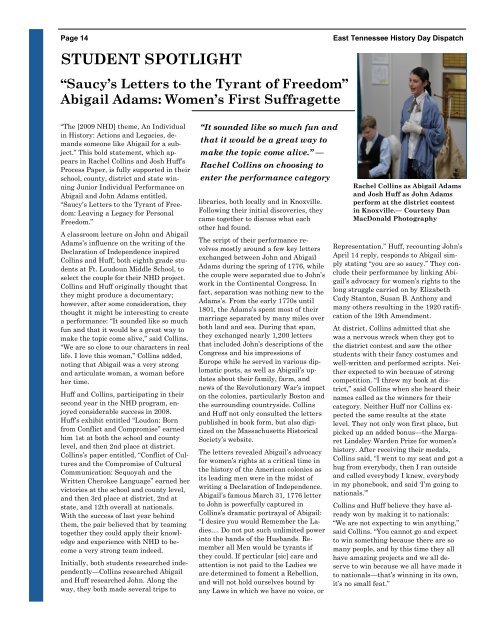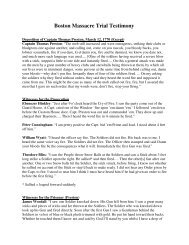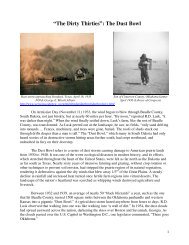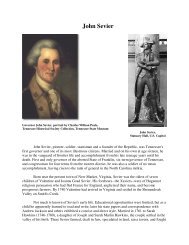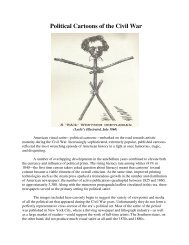Volume 1, Issue 1 - Teach American History
Volume 1, Issue 1 - Teach American History
Volume 1, Issue 1 - Teach American History
You also want an ePaper? Increase the reach of your titles
YUMPU automatically turns print PDFs into web optimized ePapers that Google loves.
Page 14<br />
STUDENT SPOTLIGHT<br />
“Saucy’s Letters to the Tyrant of Freedom”<br />
Abigail Adams: Women’s First Suffragette<br />
“The [2009 NHD] theme, An Individual<br />
in <strong>History</strong>: Actions and Legacies, demands<br />
someone like Abigail for a subject.”<br />
This bold statement, which appears<br />
in Rachel Collins and Josh Huff’s<br />
Process Paper, is fully supported in their<br />
school, county, district and state winning<br />
Junior Individual Performance on<br />
Abigail and John Adams entitled,<br />
“Saucy’s Letters to the Tyrant of Freedom:<br />
Leaving a Legacy for Personal<br />
Freedom.”<br />
A classroom lecture on John and Abigail<br />
Adams’s influence on the writing of the<br />
Declaration of Independence inspired<br />
Collins and Huff, both eighth grade students<br />
at Ft. Loudoun Middle School, to<br />
select the couple for their NHD project.<br />
Collins and Huff originally thought that<br />
they might produce a documentary;<br />
however, after some consideration, they<br />
thought it might be interesting to create<br />
a performance: “It sounded like so much<br />
fun and that it would be a great way to<br />
make the topic come alive,” said Collins.<br />
“We are so close to our characters in real<br />
life. I love this woman,” Collins added,<br />
noting that Abigail was a very strong<br />
and articulate woman, a woman before<br />
her time.<br />
Huff and Collins, participating in their<br />
second year in the NHD program, enjoyed<br />
considerable success in 2008.<br />
Huff’s exhibit entitled “Loudon: Born<br />
from Conflict and Compromise” earned<br />
him 1st at both the school and county<br />
level, and then 2nd place at district.<br />
Collins’s paper entitled, “Conflict of Cultures<br />
and the Compromise of Cultural<br />
Communication: Sequoyah and the<br />
Written Cherokee Language” earned her<br />
victories at the school and county level,<br />
and then 3rd place at district, 2nd at<br />
state, and 12th overall at nationals.<br />
With the success of last year behind<br />
them, the pair believed that by teaming<br />
together they could apply their knowledge<br />
and experience with NHD to become<br />
a very strong team indeed.<br />
Initially, both students researched independently—Collins<br />
researched Abigail<br />
and Huff researched John. Along the<br />
way, they both made several trips to<br />
“It sounded like so much fun and<br />
that it would be a great way to<br />
make the topic come alive.” —<br />
Rachel Collins on choosing to<br />
enter the performance category<br />
libraries, both locally and in Knoxville.<br />
Following their initial discoveries, they<br />
came together to discuss what each<br />
other had found.<br />
The script of their performance revolves<br />
mostly around a few key letters<br />
exchanged between John and Abigail<br />
Adams during the spring of 1776, while<br />
the couple were separated due to John’s<br />
work in the Continental Congress. In<br />
fact, separation was nothing new to the<br />
Adams’s. From the early 1770s until<br />
1801, the Adams’s spent most of their<br />
marriage separated by many miles over<br />
both land and sea. During that span,<br />
they exchanged nearly 1,200 letters<br />
that included John’s descriptions of the<br />
Congress and his impressions of<br />
Europe while he served in various diplomatic<br />
posts, as well as Abigail’s updates<br />
about their family, farm, and<br />
news of the Revolutionary War’s impact<br />
on the colonies, particularly Boston and<br />
the surrounding countryside. Collins<br />
and Huff not only consulted the letters<br />
published in book form, but also digitized<br />
on the Massachusetts Historical<br />
Society’s website.<br />
The letters revealed Abigail’s advocacy<br />
for women’s rights at a critical time in<br />
the history of the <strong>American</strong> colonies as<br />
its leading men were in the midst of<br />
writing a Declaration of Independence.<br />
Abigail’s famous March 31, 1776 letter<br />
to John is powerfully captured in<br />
Collins’s dramatic portrayal of Abigail:<br />
“I desire you would Remember the Ladies....<br />
Do not put such unlimited power<br />
into the hands of the Husbands. Remember<br />
all Men would be tyrants if<br />
they could. If perticular [sic] care and<br />
attention is not paid to the Ladies we<br />
are determined to foment a Rebellion,<br />
and will not hold ourselves bound by<br />
any Laws in which we have no voice, or<br />
East Tennessee <strong>History</strong> Day Dispatch<br />
Rachel Collins as Abigail Adams<br />
and Josh Huff as John Adams<br />
perform at the district contest<br />
in Knoxville.— Courtesy Dan<br />
MacDonald Photography<br />
Representation.” Huff, recounting John’s<br />
April 14 reply, responds to Abigail simply<br />
stating “you are so saucy.” They conclude<br />
their performance by linking Abigail’s<br />
advocacy for women’s rights to the<br />
long struggle carried on by Elizabeth<br />
Cady Stanton, Susan B. Anthony and<br />
many others resulting in the 1920 ratification<br />
of the 19th Amendment.<br />
At district, Collins admitted that she<br />
was a nervous wreck when they got to<br />
the district contest and saw the other<br />
students with their fancy costumes and<br />
well-written and performed scripts. Neither<br />
expected to win because of strong<br />
competition. “I threw my book at district,”<br />
said Collins when she heard their<br />
names called as the winners for their<br />
category. Neither Huff nor Collins expected<br />
the same results at the state<br />
level. They not only won first place, but<br />
picked up an added bonus—the Margaret<br />
Lindsley Warden Prize for women’s<br />
history. After receiving their medals,<br />
Collins said, “I went to my seat and got a<br />
hug from everybody, then I ran outside<br />
and called everybody I knew, everybody<br />
in my phonebook, and said ‘I’m going to<br />
nationals.’”<br />
Collins and Huff believe they have already<br />
won by making it to nationals:<br />
“We are not expecting to win anything,”<br />
said Collins. “You cannot go and expect<br />
to win something because there are so<br />
many people, and by this time they all<br />
have amazing projects and we all deserve<br />
to win because we all have made it<br />
to nationals—that’s winning in its own,<br />
it’s no small feat.”


